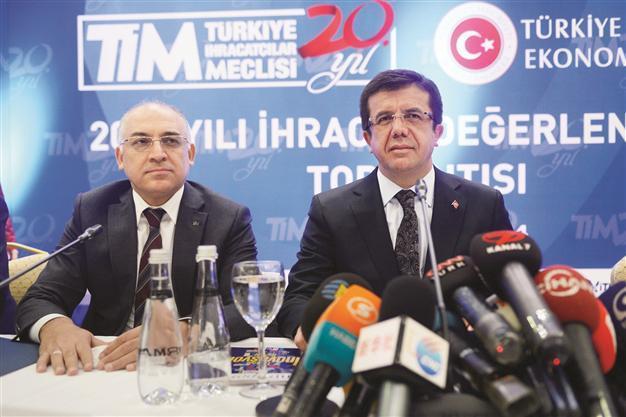Turkish export chief slams Central Bank strategies
ISTANBUL - Reuters

TİM Chairman Büyükekşi (L) and Econoym Minister Zeybekçi speak at yesterday’s ceremony held in Ankara. AA Photo
Some Turkish firms are losing money because the Central Bank failed to stabilize the lira currency, the head of an industry body said on Jan. 2, in a sign of exasperation within the business community over authorities’ economic management.
“The Central Bank’s indication of a forex rate level but the failure to subsequently achieve this is causing losses to companies which made transactions trusting in the central bank,” said Mehmet Büyükekşi, chairman of the Turkish Exporters Assembly (TIM), an umbrella group for some 52,000 firms.
He was speaking at a news conference to announce TIM’s estimate that Turkish exports totaled $151.71 billion last year, virtually unchanged from 2012, when they jumped about 13 percent.
“We in the export camp attach great importance in particular to keeping to a minimum the volatility in forex markets,” Büyükekşi said.
In August, Central Bank governor Erdem Başçı said people should not be surprised if the lira ended the year at 1.92 to the U.S. dollar.
But because of capital outflows from nervous investors in Turkish bonds, worsened by a high-level corruption scandal that erupted in the government last month, that forecast proved to be way off the mark.
The lira ended last year at 2.15, down about 17 percent against the dollar during 2013. It hit a fresh record low below 2.18 yesterday.
Büyükekşi did not discuss his criticisms of Central Bank policy in detail, but made clear that he wanted more effective policy this year.
“The Central Bank’s policies for 2014 are of vital importance,” he said, adding that the prospect of reduced U.S. monetary stimulus was making global conditions increasingly difficult, boosting interest rates and making financing tighter for Turkish firms.
“Possible capital flight from emerging markets is exerting pressure on the current account deficit and exchange rates. Parallel to this, we are facing higher interest rates in the new period. The period of plenty and cheap liquidity is coming to an end.”
